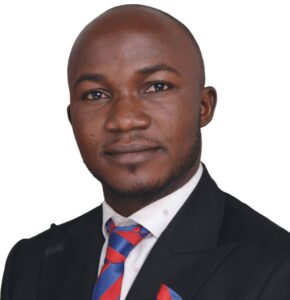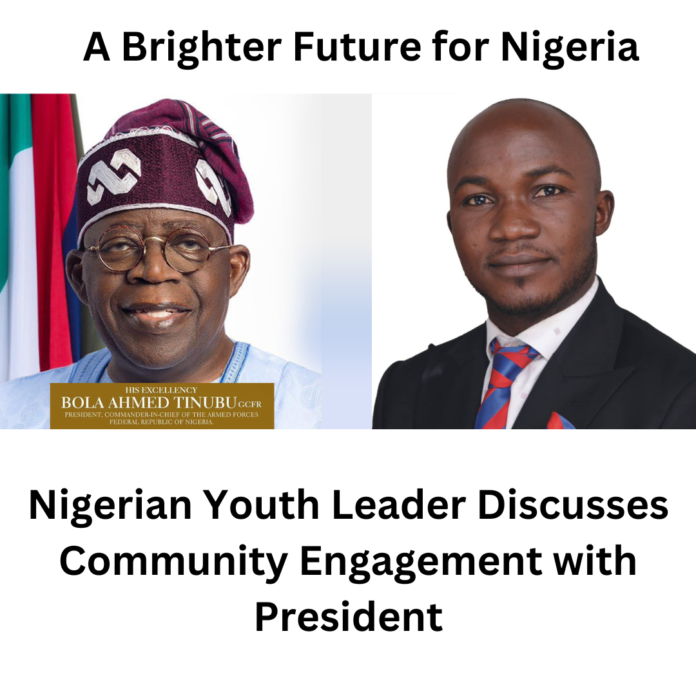Acclaimed Economist, Political and Data Analyst, Tama Monday Yari, recently visited the Presidential Villa as a Community Engagement Specialist under the Senior Special Assistant to the President on Community Engagement (North Central). With experience in community engagement, Yari aims to bridge the gap between the government and citizens, particularly in the North Central region. In this exclusive interview, Yari shares insights from his meeting with the President, discussing key issues, proposed solutions, and the importance of community engagement for Nigeria’s stability and development.

1. Can you briefly introduce yourself and your organization?
My name is Tama Monday Yari. I am an Economist, Political and Data Analyst with experience in community engagement. Over the years, I have successfully developed and managed impactful projects across civil society, private sector, and government spheres. Some of my notable achievements was partnering with the Office of the Special Adviser to the Lagos State Government on SDG and Investment, where I proposed and developed the Local Government Economic Summit and the ‘2km Rule’ initiative.
The Local Government Economic Summit was designed to identify comparative advantages between local governments for economic and social development, strengthen bottom-up growth, enhance community integration, and bolster security. The ‘2km Rule’ initiative advocated for enterprises to purchase goods and services within a 2km radius, a strategy that significantly contributed to boosting Lagos’ GDP, encouraging local production, creating employment opportunities, reducing poverty, and fostering synergy between corporate entities and communities.
Additionally, I made substantial contributions to the yearly assessment of the Nigerian Legislature, which has become an influential platform for evaluating the performance of individual legislators.
I also lead the African Center for Youth Development, Education, and Advocacy Initiative, a youth-led organization with a presence in multiple African countries, committed to empowering youth through education, development, and advocacy.
2. What took you to the Presidential Villa?
I was invited to the Presidential Villa because I was among the selected Nigerian accepted as a Community Engagement Specialist within the auspices of the Senior Special Assitant to the President on Community Engagement (North Central) under the Citizen Assembly.
3. What was the primary purpose of your visit to the Presidential Villa, and what did you hope to achieve?
The primary purpose of my visit to the Presidential Villa was for the inauguration and oath-taking ceremony as a Community Engagement Specialist, where I was also briefed on the terms of reference for the role. My goal is to learn, while effectively conveying the needs and concerns of young people and communities to the authorities.
4. Can you tell me more on the specific issue you discussed?
During the discussion, we focused on fostering meaningful community engagement and dialogue across the North Central region. Key areas included promoting civic participation and local development initiatives, providing accurate and verifiable information on local challenges to the Office of the Senior Special Assistant to the President on Community Engagement (North Central), and maintaining productive relationships with key stakeholders, such as traditional rulers, local government executives, and councilors. Additionally, we discussed supporting and participating in state-level and regional programs and projects.
5. How does this issue affect Nigeria or your immediate community, and what are the consequences (if any) if not addressed?
Fostering meaningful community engagement and dialogue across the North Central region is critical for Nigeria’s stability and development. Without active civic participation and local development initiatives, communities may feel marginalized, leading to increased social unrest and a disconnect between the government and the people. If timely and accurate information on local challenges is not provided, policy responses may be ineffective, exacerbating existing issues. Furthermore, failing to maintain productive relationships with key stakeholders, such as traditional rulers and local government leaders, can weaken the implementation of state-level and regional programs, hindering progress and growth. Addressing these issues is essential to ensure inclusive governance, social cohesion, and sustainable development in Nigeria.
6. What solutions or recommendations did you present to the President?
I presented several recommendations to the Presidency, including the need to establish structured platforms for ongoing community dialogue across the North Central region to ensure that voices at the grassroots are heard, enhancing civic education to promote greater participation in local development initiatives. Additionally, the implementation of a more robust system for gathering and verifying information on local challenges, which would provide the Office of the Senior Special Assistant to the President on Community Engagement with accurate data for informed decision-making and escalating accordingly. Lastly, I emphasized the importance of strengthening relationships with key stakeholders, including traditional rulers and local government leaders, to ensure the successful execution of state-level and regional programs.
7. What was the presidency’s response and how will it affect the future of this matter?
The responses were promising, as it indicates willingness at the highest level of government to prioritize and address the issues. By adopting the above recommendations, the government is likely to enhance civic participation, improve local development outcomes, and create a more inclusive and responsive governance framework, which will benefit the region and the country as a whole.
8. Is there a message you’d like to share with Nigerians?
Yes, I have a message for my fellow Nigerians. It is vital that we all remain law-abiding citizens, as our collective adherence to the rule of law is the foundation of a stable and prosperous society. While we fulfill our duties as citizens, we must also cultivate a culture of holding our government accountable. This means staying informed, actively participating in civic processes, and demanding transparency and integrity from our leaders. Corruption at any level undermines our progress, erodes trust in institutions, and hinders national development. We must shun all forms of corruption, both in public and private spheres, and advocate for justice and fairness in all aspects of our lives. By doing so, we contribute to building a nation where every citizen has the opportunity to thrive, and where the government serves the people with honesty and dedication. Let us work together to create a brighter future for Nigeria, one defined by integrity, accountability, and respect for the law
9. How can Nigerians support or contribute to the efforts you’re making on this issue?
Nigerians can support and contribute to these efforts by actively participating in community dialogues and sharing their insights on local challenges. Your experiences and perspectives are invaluable in accurately conveying the issues faced by our communities. Additionally, staying informed about government initiatives and engaging in civic activities, such as attending town hall meetings, joining community organizations, or using social media to voice concerns, can help ensure that the government is aware of the real needs at the grassroots level.
10. What’s next after this meeting?
The next step is to begin active engagement with communities across the North Central region. This will involve gathering insights, understanding local challenges, and fostering dialogue. We will also be holding monthly meetings to brief the Office of the Senior Special Assistant to the President on Community Engagement (North Central), ensuring that the concerns and needs of the communities are communicated effectively and addressed at the highest levels of government. This ongoing process will help create a continuous feedback loop between the citizens and the government, leading to more informed and impactful decision-making.
Your social handles
https://www.linkedin.com/in/tamamondayyari/
https://x.com/tamamonday
https://www.instagram.com/tamamonday
By fostering dialogue between citizens and the government, Yari hopes to ensure that the needs and concerns of all Nigerians are heard. His recommendations, if implemented, could lead to a more inclusive and responsive government, ultimately benefiting the entire nation. By working together, Nigerians can build a stronger and more prosperous nation.




